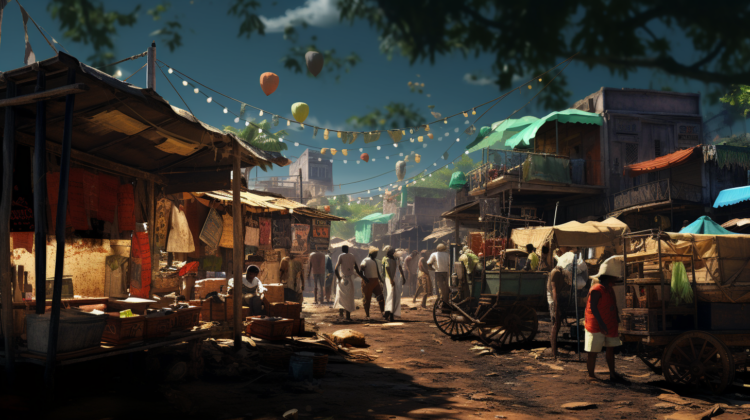“Pardon?”
“You’re still hungover wit.” The guard laughed as he fished durian from his pocket and handed one to Jason. “Me too. This help me you both no?”
Jason emulated the guard, digging his fingers into the durian’s hide and then consuming as much of it as he could, hoping he wouldn’t end up with dysentery later—if there was a later.
The guard motioned for Jason to halt and others to stand down outside a shipping container repurposed as an office. He wiped his mouth on the sleeve of his t-shirt, gestured at the office, and declared, “Immaculate,” before walking away.
Jason stood frozen for a moment in the heat, stink of welders torches and machinery, and the nagging feeling that the wall and its barbed wire might not be there just to keep people out of the junkyard.
“Jason?” A voice called from the office. “Come in please.”
Jason had read everything he could find on Immaculate, but it wasn’t enough to prepare him from stepping inside the office to find tattooed skin and bones topped by a bristle of gray stubble.
“You came to talk about a deal? I’m not interested.”
Jason wasn’t about to be played like that. He took a seat in a plastic chair across from Immaculate, seated behind a sheet metal desk in a worn out sofa.
“We agreed to talk about things before I made it here to Rouvenma.”
Immaculate’s face turned hard. “We also agreed this would be a conversation between me and you. Did you tell me Americans would be here? You did not.”
Americans? Jason wondered, then tried, “Look, I don’t know what you mean by that but I’ve got a direct line to a couple million euros. It’s yours if I get what I want out of the deal.”
Immaculate shuffled papers on his desk until he found a page at Jason. “I can make that kind of money on my own.”
“In a fiscal quarter.” Jason shoved it back. “I’m talking two million euros, clear and free, to you and you alone Immaculate.”
“We never talked about what’s in it for you.” Immaculate challenged.
Jason shrugged. “My client’s agreed to compensate me well for my travel and results. That makes this a win win, doesn’t it?”
Immaculate’s face turned into a snarl. “Then why are American soldiers here, right now!”
“I don’t know anything about…”
Immaculate interrupted, “We can bury you in the latrine trench. Answer me in five, four…”
What’s he talking about?
“I have no idea about American troops…”
Dammit I don’t know!
“Three…”
“…here in Rouvenma.”
Immaculate leaned back in his chair and laughed as he pulled a laser pistol from his holster and pointed it at Jason’s chest. “You like girls?”
Jason nodded.
Immaculate leaned into his desk and pulled out a stack of Rouvenman money. “You go have good times today, tonight. You come back tomorrow Mr. Jason.”










COMMENTS